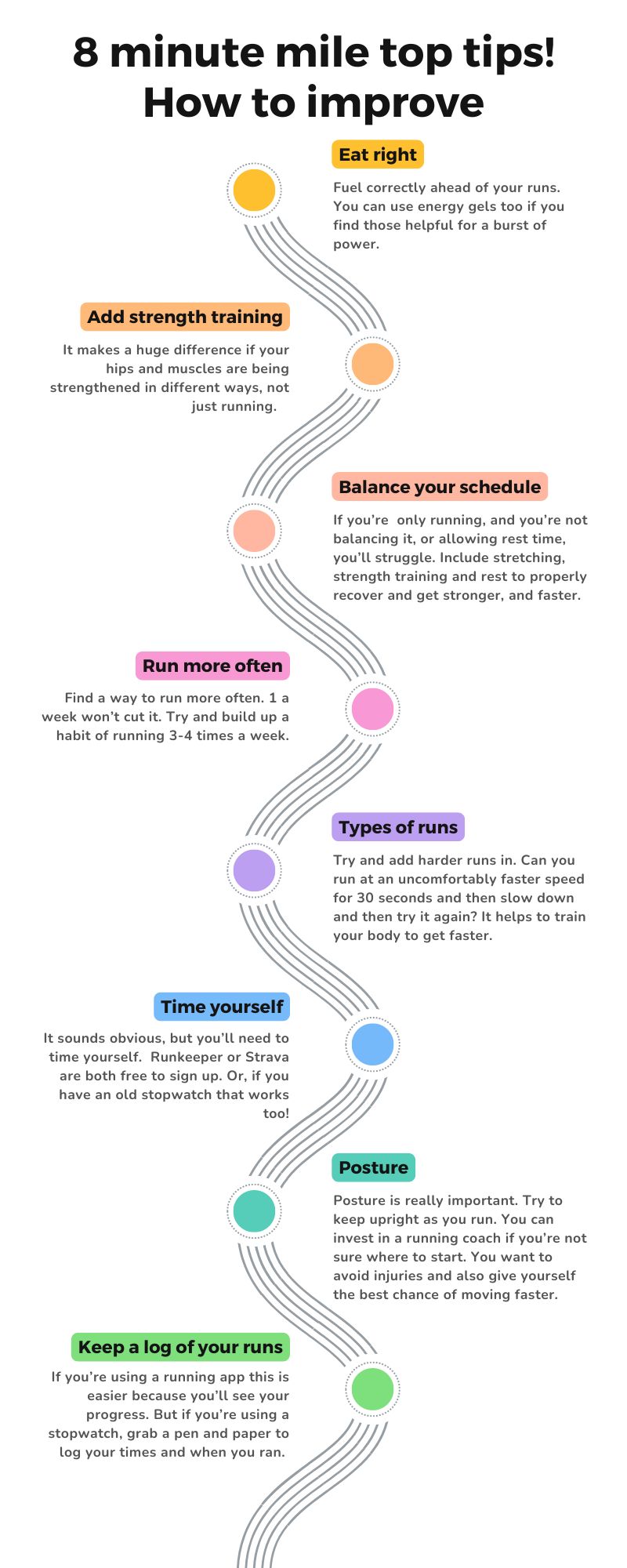Yes! Well, it depends. I’ve been running for years; I’ve done 2 half marathons and clocked up over 200 miles on Runkeeper. So, an a 8 minute mile is a good achievement for me. If I do a mile in 8 minutes, it’s a good day. But there’s so many factors to this. For example, let’s imagine that someone has been running even longer, done more races, been more intense with their strength training or had a running coach, an 8 minute mile might seem really slow to them!
For running beginners?
An 8 minute mile is hard! I’ve been running for a lot of my life (I’m 28 as I write this), but if I run a longer distance (at the moment that could be 4 miles or more), then I’m hitting 9 minutes per mile. And that’s okay by the way, I’m still beating everyone on the sofa! If you’re struggling with comparison, I’ve told my running comparison story over on another article > never compare yourself plus some quotes!
Average mile times for each stage of runners
| Runner Type | Average Mile Time |
| Beginner | 10-12 minutes |
| Experienced Runner | 7-9 minutes |
| Professional Runner | 4-6 minutes |
What is an 8-minute mile pace in mph?
An 8-minute mile is a respectable pace for many runners, especially beginners. It translates to roughly 7.5 miles per hour.
What are the benefits of running an 8-minute mile?
- Improved Cardiovascular Health: Running at a moderate pace can strengthen your heart and improve your overall cardiovascular health.
- Increased Endurance: Regular training can boost your endurance, making it easier to maintain a faster pace for longer distances.
- Weight Loss: Running is an effective way to burn calories and aid in weight loss.
- Mental Health Benefits: Running can reduce stress, improve mood, and boost self-esteem.
How can I assess my current pace?
To determine your current pace, you can:
- Use a Running App: Many running apps can track your pace in real-time.
- Time Yourself: Run a mile and note how long it takes you to complete it.
- Use a Treadmill: If you’re running on a treadmill, the machine will usually display your pace.
How can I train to run a mile in 8 minutes?
Here’s my tops tips!

- Build a Strong Foundation:
- Start with a base of consistent running, gradually increasing your mileage over time. Aim for at least 3-4 runs per week.
- Incorporate intervals to improve speed. Alternate between running at a faster pace and a slower recovery pace.
- Focus on Speed Workouts:
- Fartleks: Vary your pace randomly during your run.
- Hill repeats: Run up hills at a faster pace and jog back down for recovery.
- Tempo runs: Run at a steady, challenging pace for a sustained period.
- Prioritize Strength Training:
- Incorporate strength training exercises to build lower body strength and improve running efficiency.
- Pay Attention to Form:
- Good running form can help prevent injuries and improve your pace. Focus on maintaining a tall posture, avoiding excessive heel striking, and swinging your arms naturally.
- Rest and Recovery:
- Ensure adequate rest to allow your body to recover and adapt.
- Consider cross-training activities like swimming or cycling to reduce stress on your running muscles.
Note: This is a general guideline. Consult with a healthcare professional or certified running coach for personalized advice.
What are some tips for running a mile in 8 minutes on a treadmill?
- Adjust the incline: To simulate running outdoors, adjust the incline on your treadmill to mimic hills or inclines.
- Stay hydrated: Drink plenty of water before, during, and after your runs.
- Listen to your body: If you’re experiencing pain or discomfort, take a break and rest.
- Find a running buddy: Having a running partner can help you stay motivated and accountable.
Remember: Progress takes time. Be patient with yourself and celebrate your achievements along the way.
Top 3 Mistakes When Trying to Run 8-Minute Miles
- Overtraining: Pushing yourself too hard, too soon can lead to injuries and burnout. Gradually increase your mileage and intensity to avoid this.
- Neglecting Form: Poor running form can contribute to injuries and inefficiency. Focus on maintaining a good posture, avoiding excessive heel striking, and swinging your arms naturally.
- Inadequate Fueling and Hydration: Not consuming enough calories or fluids can lead to fatigue and decreased performance. Ensure you’re eating a balanced diet and staying hydrated, especially during long runs.
Written by Katie McDonald, 16th September 2024
Instagram | Runkeeper | Facebook | X (Formerly Twitter) | LinkedIn
